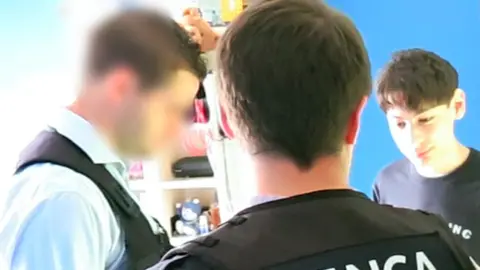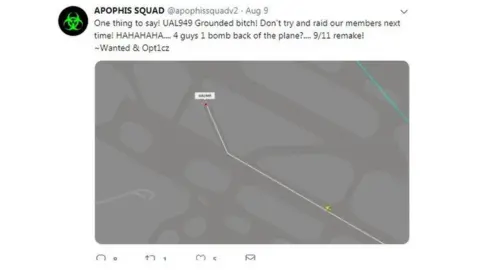Schools bomb hoaxes: Teenager jailed for nationwide threats
A teenager who sent thousands of hoax bomb threats to schools and triggered an American airline security scare has been jailed for three years.
George Duke-Cohan, 19, sparked nationwide panic and a transatlantic investigation from the bedroom of his home in Watford, Hertfordshire.
He pleaded guilty at Luton Crown Court in September to three counts of making hoax bomb threats.
It followed an investigation by the National Crime Agency (NCA).
Duke-Cohan, of Mutchetts Close, caused widespread panic in March when he emailed more than 1,700 schools, colleges and nurseries across the UK to warn about an explosive. Hundreds of the schools were evacuated.
He was arrested days later but in April, he sent another batch of hoax emails to schools in the US and UK.
NCA investigators, working with the FBI, also found that while on bail for the bomb hoaxes, Duke-Cohan had made a fake report of a hijacked US-bound plane.
'Perverted fun'
Jailing him, Judge Richard Foster said: "You knew exactly what you were doing and why you were doing it, and you knew full well the havoc that would follow.
"You were playing a game for your own perverted sense of fun in full knowledge of the consequences.
"The scale of what you did was enormous," he added.
His defence barrister said psychology experts had described Duke-Cohen as very immature, but the prosecution said he craved attention from his followers on social media.
Marc Horsfall, senior investigating officer with the NCA, said Duke-Cohan had few real friends and spent "a great deal of his time online".
 National Crime Agency
National Crime AgencyHe had no previous convictions and lived with his mother and sister, but was linked to a cyber-hacker group on Twitter calling itself the Apophis Squad.
In January 2018, the IT student was expelled from West Herts College for issuing a bomb threat.
Police were in the process of organising a community resolution order for his actions when "events overtook them" two months later, the NCA said.
His first bomb hoax email was prompted by a disagreement with the owners of VeltPvP, a US-based server that allows users to play the game Minecraft.
'Columbine heroes'
The email warned a student had entered schools with a bomb - and demanded $5,000 to be deposited in VeltPvP's account.
More than 400 schools across the UK were evacuated before the email was dismissed as a hoax.
Duke-Cohan was arrested at home within two days and his laptops, USB sticks and mobile phones were seized.
His second batch of hoax emails did not contain a financial demand.
 Twitter
TwitterIt claimed pipe bombs were hidden on schools' premises and a car would be driven at students at home-time.
One email sent to Marlborough College in Wiltshire said: "We follow in the footsteps of our two heroes who died in the Columbine High School shooting."
Prosecutor Rebecca Austin said it was "clear" that Duke-Cohan used the influence of the Columbine attack of 1999 to add "authenticity".
He was arrested for a second time and released on bail with conditions that he did not use electronic devices.
But while on bail Duke-Cohan called San Francisco airport posing as the concerned father of a girl on board United Airlines flight UAL 949, claiming hijackers had taken over the flight from Heathrow to San Francisco.
'9/11 remake'
The aircraft - with 295 passengers on board - was quarantined at San Francisco airport for a full security check.
A tweet sent after the plane landed included the words "9/11 remake".
Duke-Cohan was arrested for a third time on 31 August.
He was sentenced to one year in jail for the emails sent to schools and two years for the airport security scare.
Judge Foster said that, for the purposes of sentencing, he accepted Duke-Cohan had autism spectrum disorder.
'Power trip'
He said what Duke-Cohan did was "far removed from anything that could be described as naivety or a cry for help from a sick person" and his "fascination with computer hacking and your motivation of seeking notoriety is indicative of your high culpability".
Criminal psychologist Dr Samantha Lundrigan, of Anglia Ruskin University, said gamers like Duke-Cohan could easily become "disassociated from reality".
"His actions were ultimately selfish, indicative of someone who is self-absorbed, who sought retribution for a grievance and turned to the internet for control," she said.
"He will have had a power trip watching the chaos unfold, without feeling guilt or shame."
